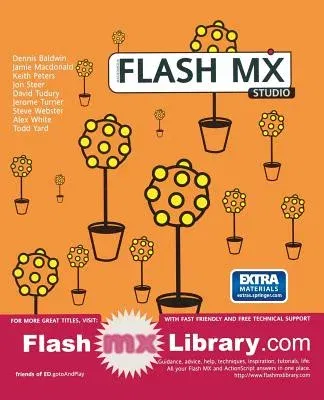Flash MX Studio takes your raw Flash talent and multiplies its potency
by focusing it on real-world web design situations. In the heady days of
the late 1990s, designers were trying their hand at anything and
everything they could lay their hands on. Now the marketplace is
seriously focused, and serious Flash designers have to know exactly what
they're doing and why. These days, it's all about functionality over
experimentation, justification over style. It's all about maturity. The
design must fit the job specs, and this book shows the reader how to
fulfill these requirements and more.
This book examines all the avenues open to professional or aspiring
professional Flash MX designers. It takes a look at advanced uses of the
new MX features, such as components and the Drawing API, and gives
guidance on building whole new structures for animation, Dynamic
Content, PHP, ColdFusion MX, XML, video, audio and audiovisual formats.
Never before has so much power been so accessible to the web designer.
This book is designed to put that power in your hands.
Flash MX Studio has been broken into four sections to address the most
common needs for the Flash designer. First off, Jamie McDonald
provides five chapters on site presentation and the principles of web
design. These opening chapters take a look at how to create slick,
professional-level sites, involving Flash MX's new drawing and motion
capabilities and interactive techniques.
The second section concentrates on ActionScript. Flash's resident coding
environment is crucial to master, and taps into Flash's great
strength--intuitive and interactive applications. Keith Peters and
Todd Yard have buddied up on this section, and examine some of the
most advanced ActionScript techniques around. Be warned--this section is
not for the faint-hearted!
Section three takes a look at Flash MX's greatly improved visual, audio
and audiovisual capabilities. Its three chapters, written by Jez
Turner and Alex White, concentrate on building a single site aimed
at displaying rich media content.
The final section is devoted to expounding a few myths about dynamic
content using Flash. Its four chapters talk about general practice,
before focusing in on specific areas, including introductions to PHP and
XML, together with a look at Macromedia's brand new ColdFusion MX.


